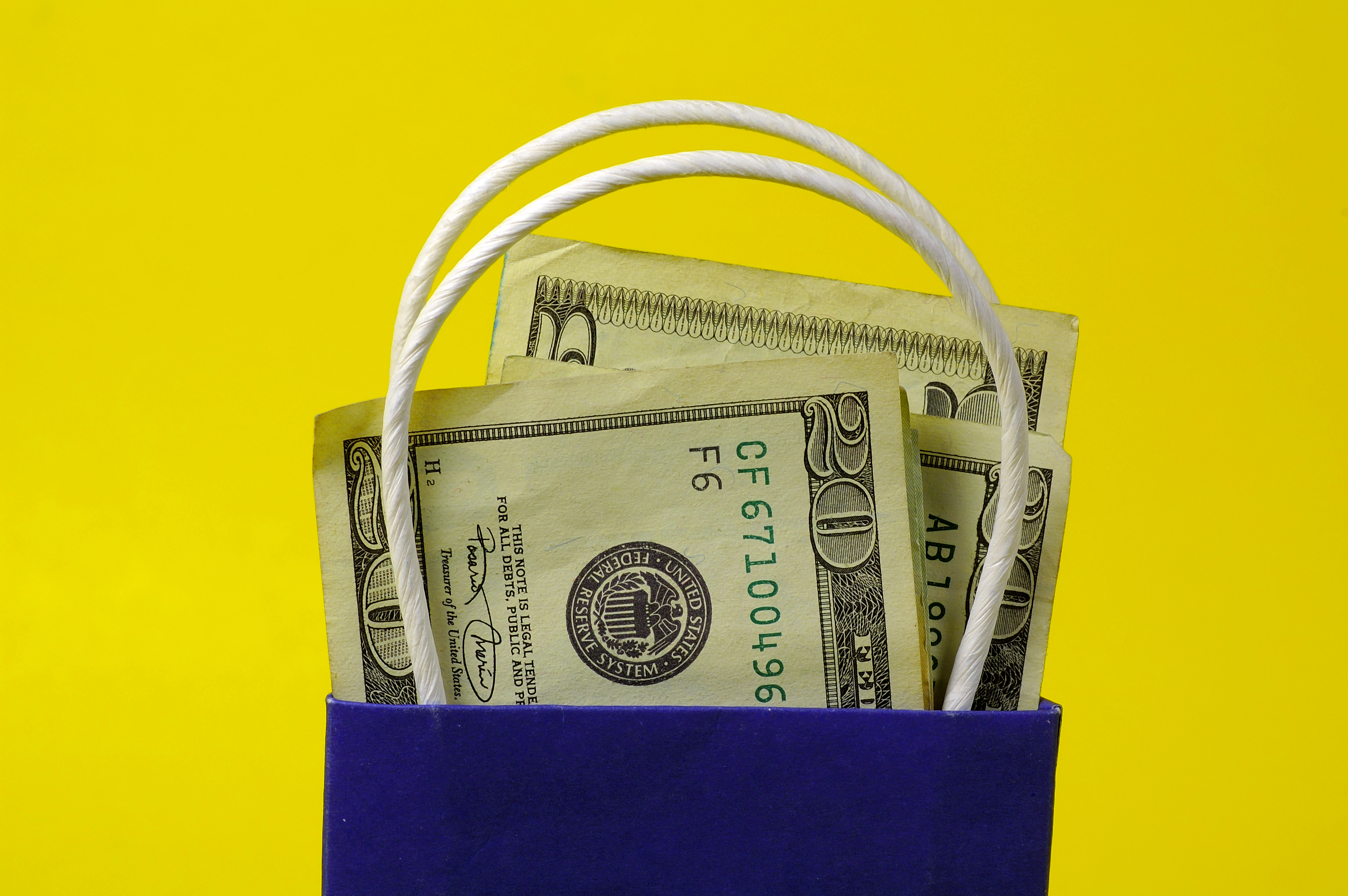Three Ways to Find Deals in Your Investments This Year
Looking for ways to save because of tariffs? Don't forget to look for deals in your investments. Here are three expert tips for making a little extra this year.







Profit and prosper with the best of Kiplinger's advice on investing, taxes, retirement, personal finance and much more. Delivered daily. Enter your email in the box and click Sign Me Up.
You are now subscribed
Your newsletter sign-up was successful
Want to add more newsletters?

Delivered daily
Kiplinger Today
Profit and prosper with the best of Kiplinger's advice on investing, taxes, retirement, personal finance and much more delivered daily. Smart money moves start here.

Sent five days a week
Kiplinger A Step Ahead
Get practical help to make better financial decisions in your everyday life, from spending to savings on top deals.

Delivered daily
Kiplinger Closing Bell
Get today's biggest financial and investing headlines delivered to your inbox every day the U.S. stock market is open.

Sent twice a week
Kiplinger Adviser Intel
Financial pros across the country share best practices and fresh tactics to preserve and grow your wealth.

Delivered weekly
Kiplinger Tax Tips
Trim your federal and state tax bills with practical tax-planning and tax-cutting strategies.

Sent twice a week
Kiplinger Retirement Tips
Your twice-a-week guide to planning and enjoying a financially secure and richly rewarding retirement

Sent bimonthly.
Kiplinger Adviser Angle
Insights for advisers, wealth managers and other financial professionals.

Sent twice a week
Kiplinger Investing Weekly
Your twice-a-week roundup of promising stocks, funds, companies and industries you should consider, ones you should avoid, and why.

Sent weekly for six weeks
Kiplinger Invest for Retirement
Your step-by-step six-part series on how to invest for retirement, from devising a successful strategy to exactly which investments to choose.
It’s always a good time to get a good deal. But as tariffs take effect on some imported goods — and as the Trump administration continues to negotiate tariffs with other countries — you may be especially interested right now in how you can save money while you shop.
Kiplinger Personal Finance Magazine has taken the time to assess how you can find deals this year on investments, groceries, electronics, clothing, cars and travel, as well as how to take advantage of credit card perks — with a special emphasis on finding deals for products and services most prone to rising prices as the trade war evolves. In this article, we look at deals on investments. (See below to find links to our other articles about deals.)
Bet on a bigger payout
Some companies stretch to make their quarterly cash payout to investors. Others could stretch a little more.
From just $107.88 $24.99 for Kiplinger Personal Finance
Become a smarter, better informed investor. Subscribe from just $107.88 $24.99, plus get up to 4 Special Issues

Sign up for Kiplinger’s Free Newsletters
Profit and prosper with the best of expert advice on investing, taxes, retirement, personal finance and more - straight to your e-mail.
Profit and prosper with the best of expert advice - straight to your e-mail.
With the help of S&P Global Market Intelligence, we looked for companies that have been adding to their cash pile, building fodder for potential payout hikes.
Wall Street analysts are bullish on these stocks now; a beefier payout would be a nice bonus. Prices are as of May 31.
Global Payments (GPN, $76) processes sales transactions for stores, restaurants and the issuers of credit cards. The company plans to use $7 billion through 2027 for share buybacks and dividends.
The $250 million in dividends it has been paying each year — $1 per share — now represents just 16% of its profits. The stock has struggled this year as investors worry about an economic slowdown hitting the company’s small-business customers.
That uncertainty has left the shares “materially undervalued,” says Morningstar analyst Brett Horn, who sees $131 per share as fair value for the stock.
Stock in HCI Group (HCI, $169), an insurer that also sells industry software, has had a good run, hitting a 52-week high in May. But the company is poised for a big jump in profits, according to a consensus of the analysts who follow it, from $8.75 in 2024 to $15.41 this year.
And the small-company stock trades at 11 times estimated 2025 earnings, well below the average multiple for property-casualty insurers. The dividend, at 40 cents per quarter, represents about 15% of 2024 profits, and it hasn’t increased in five years.
TechnipFMC (FTI, $31) specializes in equipment for oil and gas drillers who operate below the sea’s surface. Technip paid a quarterly dividend of 13 cents per share until suspending it in 2020 amid the COVID-19 energy slump.
It restarted payments in 2023 at 5 cents per share. With big jumps in cash and profits, however, the dividend payout ratio is now 10%, according to S&P. Seventeen of the 23 analysts covering the stock are bullish, according to S&P; six rate it a “hold.”
Bag a bonus when you open a brokerage account
A cash bonus shouldn’t be the only criterion you use to choose a new brokerage firm, or even a top consideration. But some cash in your pocket is a nice sweetener. We found three online brokers offering cash credits to new customers.
The deals are only good for one account, and you must fund the account with cash or assets within a certain time to qualify.
J.P. Morgan Self-Directed Investing offers up to $700 if you’re new to the firm and open an account at account.chase.com/investing/self-directedoffer. Deposit assets within 45 days, and you’ll get your bonus after the account has been open 90 days.
The more you deposit, the more you earn. A transfer of $5,000 to $24,999 will get a $50 credit, for example; $100,000 to $249,999 earns $325. Deposits of $250,000 or more fetch $700.
At Charles Schwab, the new-account bonus requires a referral from an existing Schwab client. See www.schwab.com/referral for more details. A $25,000 transfer earns $100; $50,000 gets $300. The deal tops out at a $1,000 bonus for a deposit of $500,000 or more.
E*Trade has a deal, too, if you act fast. It ends July 31, but you have until the end of September to fund the account to receive the cash credit. For a taxable brokerage account, go to us.etrade.com/promo/brokerage; head to us.etrade.com/promo/retirement for a retirement account.
Snag bargains abroad
We asked value managers — investors who focus on bargain-priced stocks — where they see opportunity these days. Many pointed to international stocks.
International value indexes reflect stocks trading at an average of about 11 times estimated earnings and 1.3 times book value (assets minus liabilities), notes Colin McQueen, portfolio manager of the T. Rowe Price International Value fund.
“That’s in line with historic valuations, while other markets have gone off to the moon,” he says.
By comparison, the S&P 500 Value index, a U.S. benchmark, has a price-earnings ratio over 17 and a book-value multiple of 3.4. U.S. investors can access foreign shares via American depositary receipts that trade here. Prices are as of May 31.
Financial stocks, particularly European banks, have performed well recently but are still recovering from COVID-era valuations that “priced in a depression that didn’t quite arrive,” says McQueen.
He recommends Barclays (BCS, $18), the giant London-headquartered financial services firm, trading at less than 8 times expected earnings and just 0.7 times book value. The stock yields 2.4%.
Another U.K.-based pick from McQueen is Informa (IFJPY, $21), a market leader in corporate events, trade shows and exhibitions. The company’s market share of that business dwarfs that of the nearest competitor, says McQueen, “and they’re widening that gap.” The stock trades at about 14 times estimated earnings and yields 2.4%
Of course, tariffs are top-of-mind overseas, too. Some stocks have been punished beyond what they should be, says David Polak, investment director at fund company Capital Group.
Take German industrial machinery firm Siemens (SIEGY, $121), for example. “Of its U.S. business, 100% is produced in the U.S.,” Polak notes.
Hermès International (HESAY, $276) has the pricing power to mitigate the impact of tariffs. The luxury goods firm has raised prices less than competitors in recent years, and it has tight control over supply, says Polak.
“They’re an example of a company in a strong position to be able to pass on costs if necessary,” he says.
Note: This item first appeared in Kiplinger Personal Finance Magazine, a monthly, trustworthy source of advice and guidance. Subscribe to help you make more money and keep more of the money you make here.
Related content
- Valuable (and Fun) Things You Can Get for Free
- Smart Ways to Save Money at Museums
- Don't Miss Out on These Four Credit Card Benefits
- How to Find Deals on Travel in 2025
- Three Ways to Spend Less on Groceries This Year
- How to Find Deals on Electronics Amid Tariffs
- Surprising Ways to Find Deals on Cars Despite Tariffs
- Strategies to Spend Less on Clothing and Online Shopping in 2025
Profit and prosper with the best of Kiplinger's advice on investing, taxes, retirement, personal finance and much more. Delivered daily. Enter your email in the box and click Sign Me Up.

Nellie joined Kiplinger in August 2011 after a seven-year stint in Hong Kong. There, she worked for the Wall Street Journal Asia, where as lifestyle editor, she launched and edited Scene Asia, an online guide to food, wine, entertainment and the arts in Asia. Prior to that, she was an editor at Weekend Journal, the Friday lifestyle section of the Wall Street Journal Asia. Kiplinger isn't Nellie's first foray into personal finance: She has also worked at SmartMoney (rising from fact-checker to senior writer), and she was a senior editor at Money.
-
 I See the Freedom in My Friend's Late-Life Divorce
I See the Freedom in My Friend's Late-Life DivorceHaving gone through a divorce myself, I know it can bring financial and emotional peace in the long run.
-
 Want to Divorce the IRS? This is How to Go About It (Legally)
Want to Divorce the IRS? This is How to Go About It (Legally)With some careful planning focused on the standard deduction, retirees who have large sums in tax-deferred accounts can avoid unpleasant tax bills and even part ways with the IRS for good.
-
 9 Ways the Wealthy Waste Thousands in Taxes — And 9 Remedies
9 Ways the Wealthy Waste Thousands in Taxes — And 9 RemediesThe tax code contains plenty of legitimate ways for the wealthy and business owners to cut taxes. Use this checklist to minimize taxes and stay compliant.
-
 I'm a Financial Planner: This Is How You Can Legally Divorce the IRS for the Rest of Your Life
I'm a Financial Planner: This Is How You Can Legally Divorce the IRS for the Rest of Your LifeWith some careful planning focused on the standard deduction, retirees who have large sums in tax-deferred accounts can avoid unpleasant tax bills and even part ways with the IRS for good.
-
 9 Ways the Wealthy Waste Thousands in Taxes: A Checklist for What Not to Miss
9 Ways the Wealthy Waste Thousands in Taxes: A Checklist for What Not to MissThe tax code contains plenty of legitimate ways for the wealthy and business owners to cut taxes. Use this checklist to minimize taxes and stay compliant.
-
 Farmers Brace for Another Rough Year
Farmers Brace for Another Rough YearThe Kiplinger Letter The agriculture sector has been plagued by low commodity prices and is facing an uncertain trade outlook.
-
 Stocks Drop as Iran Worries Ramp Up: Stock Market Today
Stocks Drop as Iran Worries Ramp Up: Stock Market TodayPresident Trump said he will decide within the next 10 days whether or not the U.S. will launch military strikes against Iran.
-
 5 Investing Rules You Can Steal From Millennials
5 Investing Rules You Can Steal From MillennialsMillennials are reshaping the investing landscape. See how the tech-savvy generation is approaching capital markets – and the strategies you can take from them.
-
 When Estate Plans Don't Include Tax Plans, All Bets Are Off: 2 Financial Advisers Explain Why
When Estate Plans Don't Include Tax Plans, All Bets Are Off: 2 Financial Advisers Explain WhyEstate plans aren't as effective as they can be if tax plans are considered separately. Here's what you stand to gain when the two strategies are aligned.
-
 Counting on Real Estate to Fund Your Retirement? Avoid These 3 Costly Mistakes
Counting on Real Estate to Fund Your Retirement? Avoid These 3 Costly MistakesThe keys to successful real estate planning for retirees: Stop thinking of property income as a reliable paycheck, start planning for tax consequences and structure your assets early to maintain flexibility.
-
 I'm a Financial Planner: These Small Money Habits Stick (and Now Is the Perfect Time to Adopt Them)
I'm a Financial Planner: These Small Money Habits Stick (and Now Is the Perfect Time to Adopt Them)February gets a bad rap for being the month when resolutions fade — in fact, it's the perfect time to reset and focus on small changes that actually pay off.